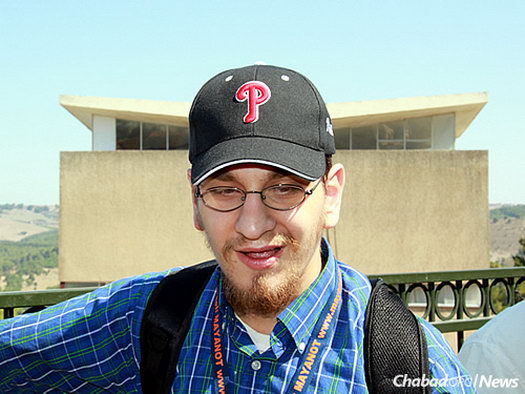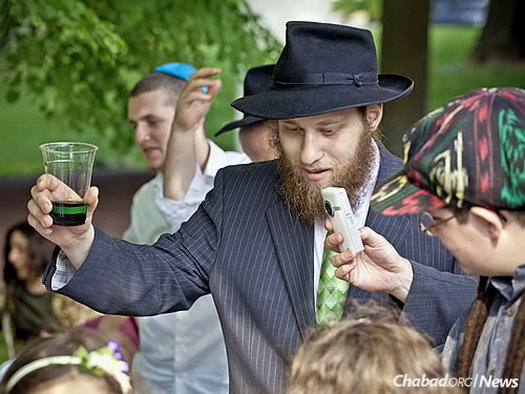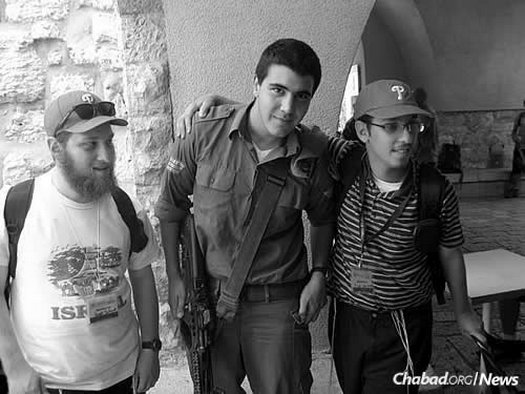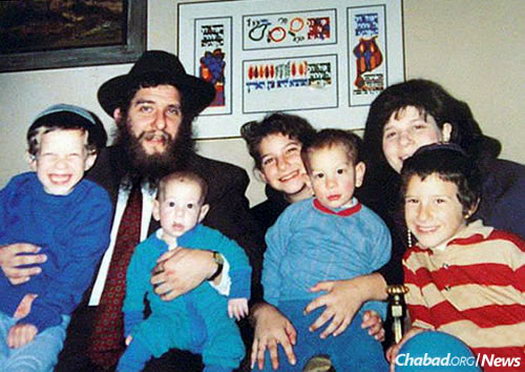
A Lesson in Inclusion: Three Special Emissaries With Special Needs
by Reuvena Leah Grodnitzky – Chabad.org
While organizations nationwide are putting their heads together to find methods and programs to foster inclusion of those with special needs, one synagogue in Philadelphia has been doing so naturally for 30 years.
“As far as we’re concerned, our sons are shluchim—Chabad emissaries—and have been so since they were born,” says Rabbi Menachem Schmidt, director of Lubavitch House of the University of Pennsylvania and rabbi of the Historic Vilna Congregation in Philadelphia, of three of his five children who were born with special needs. “In G‑d’s great wisdom, they were born with the opportunities that they have, and we’ve always treated them that way. They’ve been involved with every single part of our Chabad House all the way through, and it’s a very special merit for us.”
Yossi, Shmueli and Laible Schmidt (ages 30, 27 and 26), who now live in a Hebrew Academy for Special Children (HASC) residence in the Crown Heights neighborhood of Brooklyn, N.Y., were raised in an environment that encouraged their participation in all aspects of Jewish life and observance, despite being developmentally disabled from birth. Schmidt and his wife,Chava, recall how their three younger sons became the spirit of theShabbat table and a source of inspiration for the countless guests that they have hosted over the years.
“Even before they could stand, the boys were singing niggunim, traditional Jewish songs, and could be a part of the meal for hours,” says Chava Schmidt, whose daughter, Chani Baram, lives in Philadelphia with her husband, Rabbi Zev Baram, and children; and whose oldest son, Rabbi Benny Schmidt, lives with his wife, Shayna, and children in Brooklyn. “It was eye-opening for people because it seemed unusual that they could maintain attention for that long. Their ability to listen to the words of theTorah at the table was contradictory to what they were able to do in other settings—academically, for example.”
According to Chava Schmidt, the three took an interest in attending and participating in synagogue services as soon as they could walk, not necessarily running around and playing during services like other children.
“To this day, they participate in services from the beginning to the end. They are totally sincere, focused and present,” says Chava Schmidt. “Yossi has a visual image of each page of the prayerbook and makes sure to announce the page numbers from two different prayerbooks to make all of the congregants feel welcome and comfortable during services. It is like they have an invisible disability: You don’t see it or know it immediately upon meeting them because they are a full part of the congregation.”
According to Rabbi Schmidt, when his sons reached the age of bar mitzvah, he questioned whether they could be counted for a minyan, the prayer quorum necessitating 10 Jewish men, according to halachah (Jewish law).
“At the time, my rabbinic advisor in the matter, Rabbi Zelig Scharfstein, asked me if they know that they’re praying to G‑d when they pray,” recounts Rabbi Schmidt. “I didn’t have to think for even a millisecond that the answer is yes. So, of course, they’re counted, and they contribute greatly to theminyan and the community as full functioning members.”
And when they go to services, they go as an emissary does—bringing more spirit to the environment and praying with fervor.
‘A Different Vantage Point’
Dr. Bruce Levin, who has known the brothers since their birth, emphasizes the special purity and joy that they bring to synagogue. He notes how they have comforted community members when they suffer a loss and offer a different perspective to tragedy. He also points to the heartfelt blessings that they make over the Torah during services, and the “electrifying” wishes of “Mazal tov!” that they offer during a celebration that connects them to people.
“They have an unbridled enthusiasm and an uncanny recognition for what’s important; they can really focus in on the meat of a matter,” says Levin, a physician of pain medicine. “They have a sincere care for everyone in synagogue. Their presence is uplifting because of the way they pray and [how they] love everybody. The insights they have are so deep because they see things from a different vantage point—a higher one.”
For Ari Miller, who was a part of the Vilna Congregation for eight years, his relationship with the three brothers was formative in that it helped him be more accepting of others.
“The brothers have taught me what acceptance and love is,” said Miller, who is now a property manager in Cherry Hill, N.J. “I’m much more accepting and friendly to people that I wouldn’t otherwise be because of them. They teach you that you must love a person for who he is, and for nothing more than that. Because of them, Vilna has become a place where anyone who didn’t have a place to go could feel comfortable to go—a place of total acceptance. I learned there that if you treat every single person with kindness, love and respect, they will respond in kind and act that way back.”
Miller remarks how his interactions with the three brothers have pushed him to better himself.
“We have had a tremendously rewarding and inspirational friendship. For some reason, I saw past whatever challenges they may have, and was drawn to their talents,” says Miller. “They may have mastered a mitzvah in a way that you can never reach. For example, I have met few people with more love than Laible. It’s so inspiring to see the mitzvah of love your fellow in action. He has such a tremendous love for other people; he’ll walk up to people and hug and kiss them.”
“And maybe Yossi can’t count to 10, but he can pray from three prayerbooks at once and tell you the page numbers from each one,” continued Miller. “And I think I’m a nice guy, but standing next to Laible, I look like a jerk! The light that they shine—and their smile, a hug or a song—draws people to Vilna as much as Rabbi Schmidt does, if not more.”
And as Rabbi Schmidt remarks, the page calling is no mere gimmick; it’s an important tool to help congregants navigate services and make them feel comfortable in synagogue. They even do it during the High Holidays, even though a completely different prayerbook is used during those times.
“They pray in synagogue the entire Rosh Hashanah and Yom Kippur,” notes Chava Schmidt. “And even on Yom Kippur, when Yossi has higher anxiety and he’s been fasting, he still announces the page numbers. This has a powerful effect on people because of their sincerity, innocence and pure intentions. No one is forcing them to pray; it’s all coming from deep within them.”
While organizations nationwide are putting their heads together to find methods and programs to foster inclusion of those with special needs, one synagogue in Philadelphia has been doing so naturally for 30 years.
“As far as we’re concerned, our sons are shluchim—Chabad emissaries—and have been so since they were born,” says Rabbi Menachem Schmidt, director of Lubavitch House of the University of Pennsylvania and rabbi of the Historic Vilna Congregation in Philadelphia, of three of his five children who were born with special needs. “In G‑d’s great wisdom, they were born with the opportunities that they have, and we’ve always treated them that way. They’ve been involved with every single part of our Chabad House all the way through, and it’s a very special merit for us.”
Yossi, Shmueli and Laible Schmidt (ages 30, 27 and 26), who now live in a Hebrew Academy for Special Children (HASC) residence in the Crown Heights neighborhood of Brooklyn, N.Y., were raised in an environment that encouraged their participation in all aspects of Jewish life and observance, despite being developmentally disabled from birth. Schmidt and his wife,Chava, recall how their three younger sons became the spirit of theShabbat table and a source of inspiration for the countless guests that they have hosted over the years.
“Even before they could stand, the boys were singing niggunim, traditional Jewish songs, and could be a part of the meal for hours,” says Chava Schmidt, whose daughter, Chani Baram, lives in Philadelphia with her husband, Rabbi Zev Baram, and children; and whose oldest son, Rabbi Benny Schmidt, lives with his wife, Shayna, and children in Brooklyn. “It was eye-opening for people because it seemed unusual that they could maintain attention for that long. Their ability to listen to the words of theTorah at the table was contradictory to what they were able to do in other settings—academically, for example.”
According to Chava Schmidt, the three took an interest in attending and participating in synagogue services as soon as they could walk, not necessarily running around and playing during services like other children.
“To this day, they participate in services from the beginning to the end. They are totally sincere, focused and present,” says Chava Schmidt. “Yossi has a visual image of each page of the prayerbook and makes sure to announce the page numbers from two different prayerbooks to make all of the congregants feel welcome and comfortable during services. It is like they have an invisible disability: You don’t see it or know it immediately upon meeting them because they are a full part of the congregation.”
According to Rabbi Schmidt, when his sons reached the age of bar mitzvah, he questioned whether they could be counted for a minyan, the prayer quorum necessitating 10 Jewish men, according to halachah (Jewish law).
“At the time, my rabbinic advisor in the matter, Rabbi Zelig Scharfstein, asked me if they know that they’re praying to G‑d when they pray,” recounts Rabbi Schmidt. “I didn’t have to think for even a millisecond that the answer is yes. So, of course, they’re counted, and they contribute greatly to theminyan and the community as full functioning members.”
And when they go to services, they go as an emissary does—bringing more spirit to the environment and praying with fervor.
‘A Different Vantage Point’
Dr. Bruce Levin, who has known the brothers since their birth, emphasizes the special purity and joy that they bring to synagogue. He notes how they have comforted community members when they suffer a loss and offer a different perspective to tragedy. He also points to the heartfelt blessings that they make over the Torah during services, and the “electrifying” wishes of “Mazal tov!” that they offer during a celebration that connects them to people.
“They have an unbridled enthusiasm and an uncanny recognition for what’s important; they can really focus in on the meat of a matter,” says Levin, a physician of pain medicine. “They have a sincere care for everyone in synagogue. Their presence is uplifting because of the way they pray and [how they] love everybody. The insights they have are so deep because they see things from a different vantage point—a higher one.”
For Ari Miller, who was a part of the Vilna Congregation for eight years, his relationship with the three brothers was formative in that it helped him be more accepting of others.
“The brothers have taught me what acceptance and love is,” said Miller, who is now a property manager in Cherry Hill, N.J. “I’m much more accepting and friendly to people that I wouldn’t otherwise be because of them. They teach you that you must love a person for who he is, and for nothing more than that. Because of them, Vilna has become a place where anyone who didn’t have a place to go could feel comfortable to go—a place of total acceptance. I learned there that if you treat every single person with kindness, love and respect, they will respond in kind and act that way back.”
Miller remarks how his interactions with the three brothers have pushed him to better himself.
“We have had a tremendously rewarding and inspirational friendship. For some reason, I saw past whatever challenges they may have, and was drawn to their talents,” says Miller. “They may have mastered a mitzvah in a way that you can never reach. For example, I have met few people with more love than Laible. It’s so inspiring to see the mitzvah of love your fellow in action. He has such a tremendous love for other people; he’ll walk up to people and hug and kiss them.”
“And maybe Yossi can’t count to 10, but he can pray from three prayerbooks at once and tell you the page numbers from each one,” continued Miller. “And I think I’m a nice guy, but standing next to Laible, I look like a jerk! The light that they shine—and their smile, a hug or a song—draws people to Vilna as much as Rabbi Schmidt does, if not more.”
And as Rabbi Schmidt remarks, the page calling is no mere gimmick; it’s an important tool to help congregants navigate services and make them feel comfortable in synagogue. They even do it during the High Holidays, even though a completely different prayerbook is used during those times.
“They pray in synagogue the entire Rosh Hashanah and Yom Kippur,” notes Chava Schmidt. “And even on Yom Kippur, when Yossi has higher anxiety and he’s been fasting, he still announces the page numbers. This has a powerful effect on people because of their sincerity, innocence and pure intentions. No one is forcing them to pray; it’s all coming from deep within them.”
‘Perfect Model of Joy’
Neil Kerzner has also known the brothers since their birth. He finds that they encourage him to look at life from a different perspective, and emphasizes the special qualities of each one individually.
“Yossi is always talking about Moshiach, and who else would call me ‘the righteous Neil?’ ” says Kerzner, who is a lawyer in Philadelphia. “Laible is constantly energized; he’s so full of joy all the time. He grabs people and gets them dancing. If I could just tap into his perfect model of joy, I could break through all barriers. And often, it’s hard for me to understand Shmueli when he speaks to me, but yet I do somehow. It makes me think about how we’re all just trying to make ourselves understood in our own way. Shmueli is making himself understood in a way that’s higher than speech.”
Manny Hova, who has known the family for more than 20 years, has fostered strong relationships with the Schmidts, particularly with Laible.
“I’m from a Sephardic background, and from the day I met Laible, he expressed his love for Sephardic music,” relates Hova, a builder in Philadelphia and very active in the local Jewish community. “So for years, I would take him with me to Sephardic services, and he just loved the melodies and the spicy food. He would say, ‘I have Sephardic blood in me!’
“When Laible is somewhere, the whole room can feel him. It makes me feel so warm and beautiful to be with them in synagogue. It’s so special to just see how the boys are, so happy and always positive; I just love it.”
‘Reach for the Stars’
Chava Schmidt recalls how psychologists and therapists advised her, when her sons were little, not to teach them Hebrew for fear of confusing them. They worried about the right-to-left reading orientation and the confusion of learning two languages, and thus emphasized the benefits of sticking to just English.
“We didn’t listen and tried to let them reach for the stars as much as they wanted to,” says Chava Schmidt. “Already before his third birthday, Yossi was pushing to learn the aleph-bet just as he saw his siblings learn it. We tried our best to let our children grow into who they were, and not limit them or protect them.”
Schmidt notes the advantage of running the Vilna Congregation themselves, so that they didn’t need to seek permission to bring their sons to services.
“We had the advantage of being able to keep an eye on them at all times, but also the challenge of educating the other kids in services, who were not always so accepting,” she says. “I definitely had to intervene with kids who didn’t always treat them as they should, such as excluding my sons. It took a gentle, modeling approach to educate kids to include other children. We modeled inclusion ourselves, showing that they are a part of our family and we don’t treat them any differently. This issue needs to be addressed with every generation of children.”
Throughout their childhood and to this day, the Schmidt brothers were raised and treated no differently from their other siblings.
“We expected them to be polite and act like a mensch. We didn’t keep them from any activity and tried our best to include them whenever possible,” says Chava Schmidt. “We look at each son as his own person and expect him to do the best he can. Treating them like any other kid—that’s inclusion.”
For example, just as Chani and Benny learned to make blessings over food before eating and to keep the laws of kashrut, so did Yossi, Shmueli and Laible. And for the Shabbat of Yossi’s bar mitzvah, Rabbi Schmidt tried to give Yossi his first aliyah to the Torah. Though Yossi was not ready to accept it at the time, three years later Yossi finally accepted his first aliyah.
“We always expect the best of our children, and if they can’t live up to it, then we adjust,” says the rabbi. “We explain to other kids how to behave; it doesn’t have to do with special needs, it just has to do with treating each other appropriately. This is something we all need to be taught as kids. That was and is still difficult because people are afraid of someone who is different.”
And for Rabbi Benny Schmidt, it is clear that his brothers’ differences are what have made them so special.
“They have definitely made our community,” he says. “They have a major hand in the warmth that is in Vilna and downtown Philadelphia.”


















wow
בנימין דער דער הצלחה רבה ויישר כח!
מידידך.
A bubby schusterman ainikel
A very special family! Anyone who knows them knows Menachem and Chavas dedication to all their children helped them be who they are today.
Big Z Schapiro
wow go Lable Yossi and Shmuly Schmitd you guys rocked the house man keep up the good work
Anonymous
Beautiful!